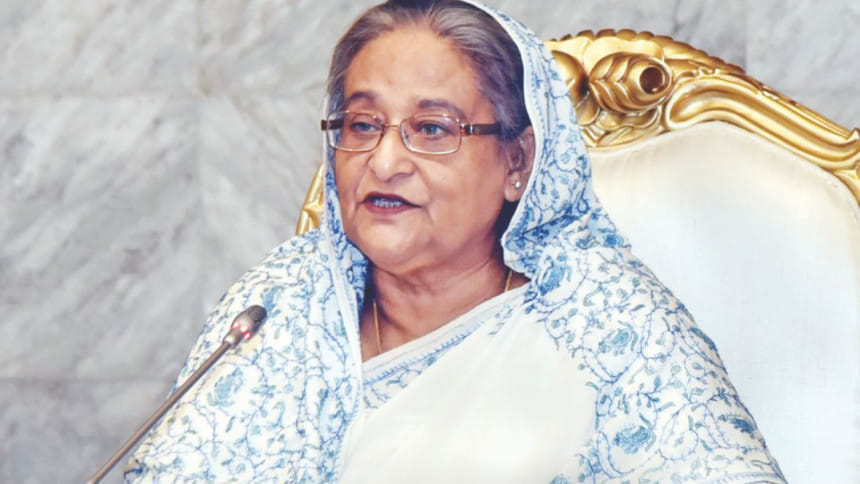Hasina outlines polls-time govt

In a major political development, Prime Minister Sheikh Hasina has outlined a framework of the next polls-time government that will be smaller in size with limited jurisdiction and will carry out only routine work.
The PM came up with the formula in parliament yesterday, rejecting the BNP's demand for an election-time supportive government which she termed “unconstitutional”.
"Our government will always uphold democracy... We will never accept any government system which is unconstitutional," she said in a scripted answer to a question.
Awami League lawmaker Tanvir Imam wanted to know the government's views on the BNP's demand for a “supportive government” for holding the next national polls.
Hasina, also president of the AL, said the Election Commission will play its due role in line with Article 126 of the constitution.
“The [polls-time] government will be smaller in size. It will only carry out its routine work during the election and will not make any decisions on policy matters,” she said.
If that is the case, the Hasina-led cabinet will become a polls-time cabinet, and it is supposed to do the same jobs as the council of advisers did during the caretaker government's tenure.
Introduced in 1996 through a constitutional amendment, the caretaker government was constituted after the then partisan government's tenure expired.
Comprised of a chief adviser and 10 advisers, it had jurisdiction to carry out only routine work. Its main functions were to provide the EC with all sorts of assistance to hold free and fair parliamentary elections.
However, the non-partisan caretaker government system was abolished in 2011, generating a political crisis which resulted in the holding of a one-sided election in January 2014.
On the completion of four years of the current government on January 12, Hasina in an address to the nation said the next parliamentary election will be held under a polls-time government in line with the constitution, meaning she will hold the office of the head of government during the election.
After around three weeks, she yesterday outlined the framework of the polls-time government.
Earlier in January last year, an AL delegation led by Hasina placed the same proposal before President Abdul Hamid during talks initiated by him over the EC's formation.
In addition, the AL suggested empowering the EC with supervising authority over the administration, law enforcement agencies and all other departments engaged in the election process.
However, no further discussion was held on the proposals in the last one year.
The last caretaker government was constitutionally barred from making any policy decisions. Its size was also fixed by the constitution.
But there will be no such constitutional bar on the polls-time cabinet led by Hasina.
Amid growing political crisis before the 2014 parliamentary election, the then PM Hasina proposed forming an all-party election-time cabinet, and offered the then main opposition BNP to join it and take ministerial portfolios of its choice.
But the BNP rejected the offer. Defending the decision, some of the BNP-led alliance leaders referred to the PM's absolute power to overrule decisions of the ministers.
Against this backdrop, some eminent citizens at a meeting with the president in 2013 proposed limiting the PM's power by amending the government's rules of business.
In November 2013, Hasina formed a polls-time cabinet of 29 ministers with MPs from the AL, the Jatiya Party and the Workers Party.
The BNP boycotted the 2014 parliamentary election.
The crisis remains unresolved till date. With the next parliamentary election getting nearer, the issue of the mode of election-time government is dominating the political landscape as the BNP continues to demand a neutral polls-time administration.
REACTION TO PM'S FORMULA
BNP Standing Committee Member Moudud Ahmed said the PM's outline of the next polls-time government is actually a framework of a partisan government.
"The national polls will not be free, fair and inclusive under a partisan government. The Election Commission will not be able to play a strong role.”
The BNP policymaker also said the PM's statement is part of the AL's plan to form a one-party government.
He mentioned that his party will sit to discuss the matter and then give a formal reaction.
About the PM's statement, Workers Party President Rashed Khan Menon said the PM has the jurisdiction to decide on the size of the polls-time government.
In reply to a query, he said Hasina in 2013 invited the BNP to join the polls-time interim government but it turned down the offer. This time, the reality is different as the BNP has no representative in the current parliament.
Contacted, Ruhul Amin Hawlader, secretary general of the main opposition Jatiya Party, said the PM rightly outlined the framework of the next polls-time government as per the constitution.
“We have no option to go beyond the constitution regarding the polls-time government,” he added.

 For all latest news, follow The Daily Star's Google News channel.
For all latest news, follow The Daily Star's Google News channel. 



Comments